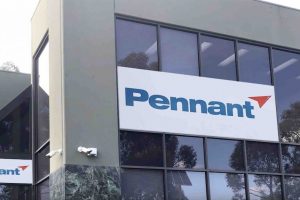Region’s leading firms caught up as fears grow over looming trade war

The South West’s largest businesses were today braced for further turmoil as international markets continued to be rattled over the impact of US tariffs.
Shares in defence giant Babcock International, which operates from more than 60 sites across the South West – including Devonport, the largest naval base in Western Europe, and a major base at Filton, Bristol – tumbled by 7.8% as stock markets across the globe were sent into a tailspin.
With equity traders’ screens turning into a sea of red in London, aerospace giant Rolls-Royce, whose shares hit a one-month low on Friday, was among those hardest hit today, with a 7.7% fall in in early trading coming after sharp declines on Friday.
Rolls-Royce’s Filton plant in Bristol, which employs around 3,400 people, makes engines for key defence programmes such as the EJ200, which powers the RAF’s Eurofighter Typhoon, and the short-take off and vertical landing (STOVL) capability for the US-built F-35 combat aircraft.
Another major manufacturing business impacted by the introduction of tariffs is Melrose, owner of aerospace and automotive group GKN, which makes aircraft wing parts for Airbus and other aviation firms at Filton and Avonmouth. Its shares were down by more than 8% in early trading.
Other major businesses whose share prices were affected included tobacco group Imperial Brands, which has its global HQ in Bristol and whose international brands include Davidoff, West, Drum and Rizla, down by 2.8%, and Rotork, the Bath-based specialist valve manufacturer which today launched a £50m share buyback programme, 4.5% lower.
Shares in Bath-headquartered media group Future, which earns more than half its revenue from the US, were down by 6.7%, while those in Melksham, Wiltshire-based defence manufacturer Avon Technologies, which supplies the US armed forces and homeland security services, eased by 5.4% within an hour of the market opening.
To add the the air of gloom, an analysis from economists at accountancy group KPMG today predicted that the trade war will cut 0.8% off the UK economy over the next two years, leaving it £21.6bn worse off by 2027.
Over the weekend, a snap poll by the British Chambers of Commerce of more than 600 businesses across the UK showed that 62% with trade exposure to the US were already taking a hit from the tariffs.
A fifth reported a “significant negative impact”, 42% reported some negative impact, 16% report no impact, 5% report some positive impact, and 2% significant positive impact.
Alongside increasing prices, 15% said they would seek alternative suppliers, while 13% said they expected to absorb the costs. Around a third (36%) said they would take no action at this time.
As a key exporter of aircraft and marine engines, Rolls-Royce’s operations are connected to the global supply chain, which is vulnerable to such trade disruptions.
This makes it particularly susceptible to the news, as tensions between the US and other nations, including China, trigger concerns about the impact on international trade.
The global stock market bloodbath has all but wiped out Rolls’ renaissance this year, which had seen its share price rise to record level in late February.
The turbulence has been sparked by a series of tariff announcements, including a 34% retaliatory tariff from China and a 20% levy on European imports to the US, which President Trump justified by saying that the US had been “taken advantage of” for years.
Today’s global stock market meltdown followed a similar picture last Friday.
Russ Mould, investment director at stockbrokers AJ Bell, said: “With markets having suffered their worst week in five years, investors were hiding under their duvet hoping the pain would go away.”
The UK market also took a hit, with the FTSE 100 dropping by nearly 4%, and the FTSE 250 sinking over 3% on Friday.
European markets felt the pressure too, with Germany’s DAX falling 5% and France’s CAC 40 dropping 4%.
Mould continued: “Unfortunately, the relentless selling continued, with markets falling across Asia and Europe and futures prices implying the US will do the same when trading begins later on.
“Investors looking to buy on the dip were spoiled for choice given the sharp declines seen on the market this week. It’s now a question of when investors feel brave enough to go shopping. Today’s extended sell-off implies investors are still too nervous to take the plunge.”
The company is ramping up its production stateside to counter the effects of Donald Trump’s trade tariffs.
Reports at the time suggested Rolls-Royce was exploring how much of its production could be moved to the US to avoid the fallout from international trade conflicts.
Last week Business West, the regional business group which runs export services in the region, said South West firms exporting to the US should consider seeking alternative markets in the wake of the US tariffs.
It said there were plenty of free trade opportunities across the globe that could be explored for firms impacted by the blanket 10% US tariff.








